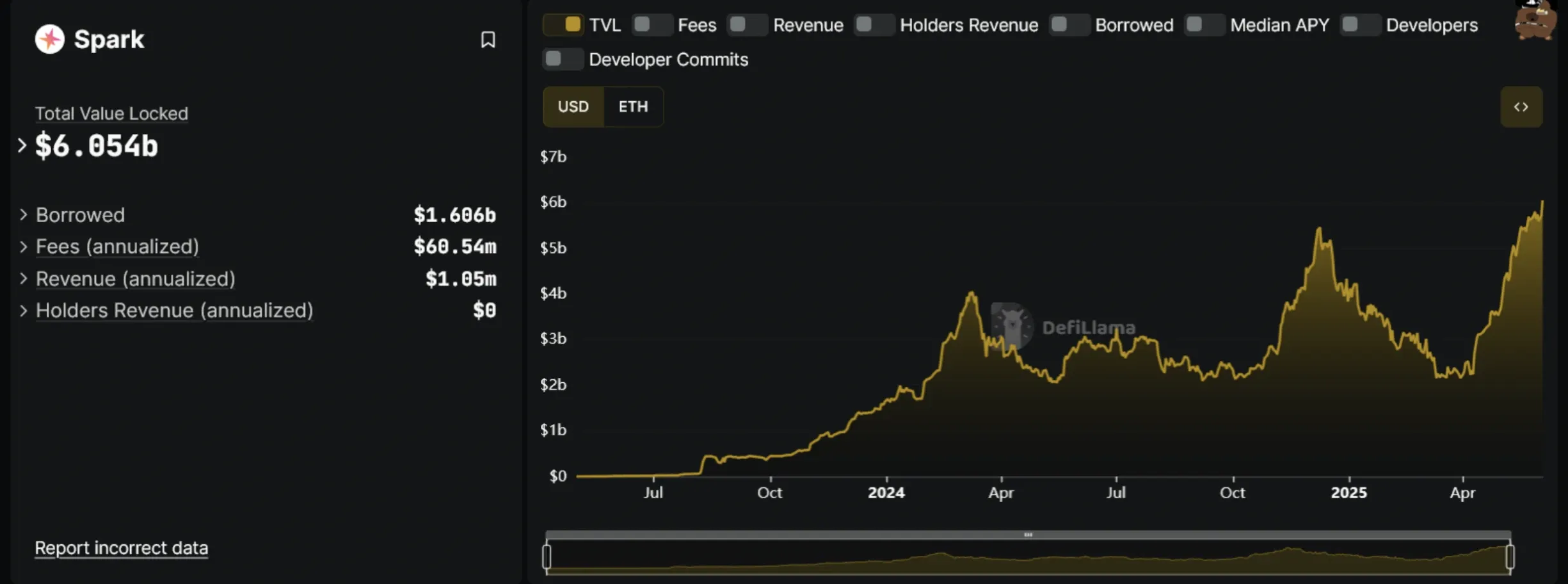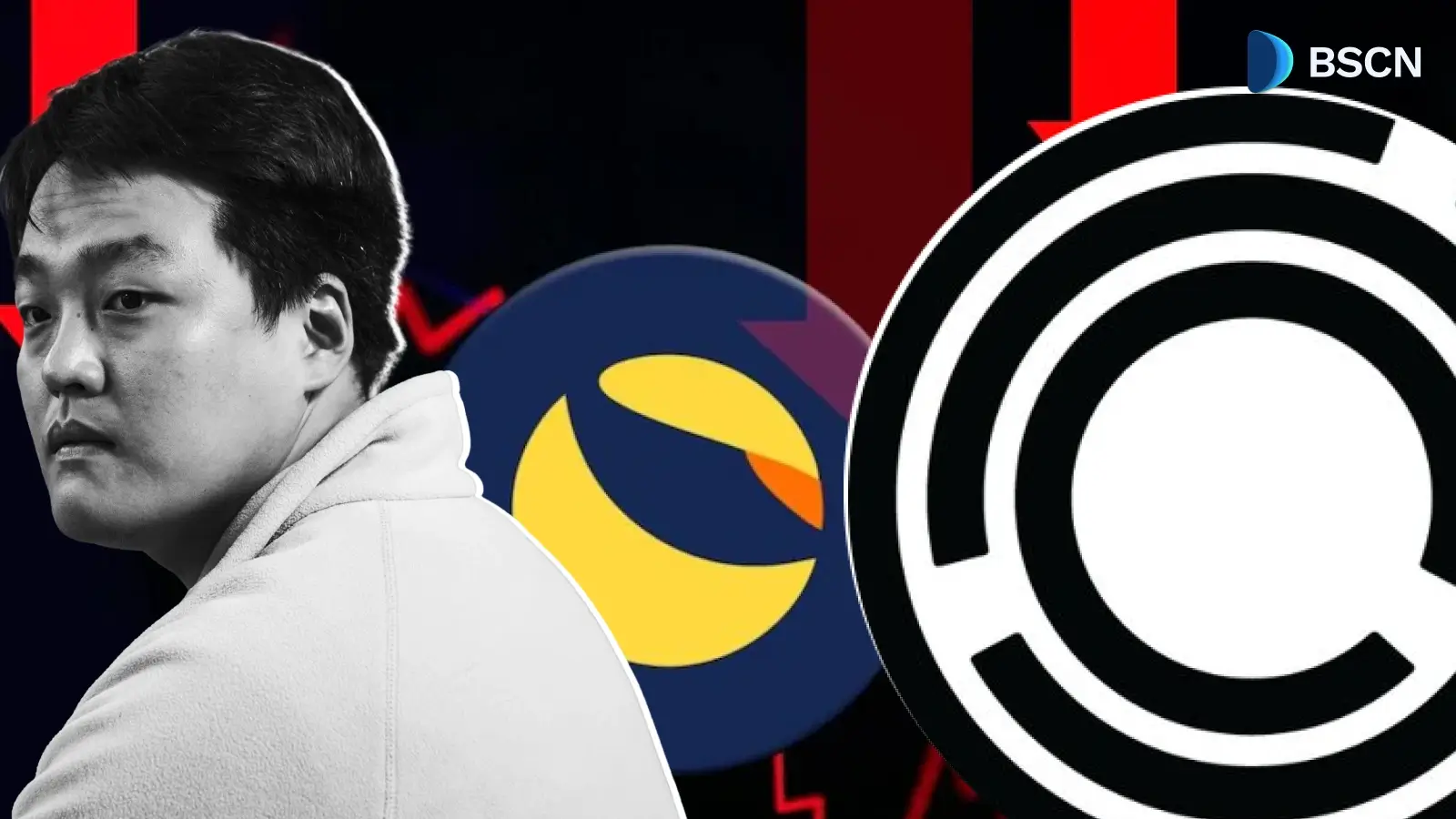Analyzing Spark Protocol: The Next Era of Stablecoin Yields

Inside Spark Protocol's rise to 6th in DeFi with $6B TVL. Discover how this Sky Ecosystem platform revolutionizes stablecoin yields through advanced lending technology.
Crypto Rich
June 4, 2025
Table of Contents
Stablecoin holders have long faced a fundamental challenge in DeFi: earning meaningful yields without sacrificing stability or liquidity. Enter Spark Protocol, an onchain capital allocator within the Sky Ecosystem that has changed the game entirely.
With over $6 billion in managed assets, Spark now ranks 6th by total value locked on DeFiLlama. But here's what makes this achievement remarkable—the protocol has revolutionized how users access stablecoin yields by offering governance-set rates that remain stable regardless of market conditions.
USDS, Sky's upgraded stablecoin that replaced DAI within the Sky Ecosystem, serves as the foundation for Spark's yield optimization. While maintaining its dollar peg like DAI, USDS unlocks additional features, including higher savings rates and cross-chain functionality that weren't possible with the original token.
Spark's three core product categories address different aspects of stablecoin optimization: Savings for yield generation, SparkLend for lending and borrowing, and the Spark Liquidity Layer for cross-chain deployment. This comprehensive ecosystem approach distinguishes Spark from single-function DeFi protocols.
The Stablecoin Yield Revolution
Traditional DeFi platforms presented stablecoin holders with an uncomfortable choice. They could accept variable rates that often dropped to near-zero during quiet periods, or hand over custody to centralized platforms for potentially higher but riskier returns.
Spark eliminated this dilemma. Instead of relying on unpredictable market-driven rates, the protocol offers yields determined through Sky's transparent on-chain voting cycles. This approach transforms stablecoin yield generation from speculation into predictable income.
The Technical Innovation: ERC-4626 Savings Tokens
Spark's revolutionary approach centers on sUSDS (Savings USDS), an ERC-4626 representation of USDS deposited in Sky's Savings Rate module. Unlike traditional yield farming that requires complex strategies, sUSDS automatically accrues value as users hold the token.
The technical elegance lies in its simplicity. Each sUSDS token is fungible and instantly redeemable for USDS with no liquidity constraints. The yield source comes from Sky's diversified revenue streams: fees from crypto-collateralized loans, U.S. Treasury bill investments, and liquidity provisioning across DeFi protocols.
What makes this revolutionary is the stability factor. While traditional DeFi yields fluctuate wildly based on market demand, Sky's Savings Rate is set by governance and funded by protocol revenue rather than borrowing activity. This creates a yield floor that doesn't disappear during market downturns.
Cross-Chain Revolution: Spark Liquidity Layer
Perhaps Spark's most ambitious innovation is the Spark Liquidity Layer (SLL), which automates stablecoin deployment across multiple blockchain networks. This system enables users on any supported chain to access Sky's yield opportunities without bridging tokens themselves.
The SLL utilizes Sky's Allocation System to mint USDS and sUSDS through Allocator Vaults, then bridges them using SkyLink to networks like Base and Arbitrum. For USDC liquidity, the system employs Circle's Cross-chain Transfer Protocol, ensuring deep liquidity across all supported networks.
This automation solves a critical DeFi problem: accessing yield opportunities across different chains without manual bridging complexity. Users on Base can now earn Sky's Savings Rate as easily as Ethereum mainnet users, with the SLL handling all backend liquidity management.
The Spark PSM: Zero-Slippage Conversions
The Spark Peg Stability Module extends Sky's mainnet liquidity to other chains, enabling swaps between USDS, sUSDS, and USDC with no slippage or fees beyond gas costs. This creates the most liquid stablecoin pairs in DeFi outside the Ethereum mainnet.
The PSM uses hardcoded 1:1 pricing for USDS and USDC, with an oracle providing sUSDS exchange rates. This eliminates market price deviations and slippage, providing institutional-grade liquidity for retail users.
SparkLend: Advanced Lending Infrastructure
USDS-Centric Money Markets
SparkLend operates as a USDS and DAI-centric money market protocol, combining direct liquidity from Sky with vertical integration across leading DeFi protocols. Unlike generic lending platforms, SparkLend optimizes specifically for stablecoin efficiency and Sky ecosystem integration.
The platform implements isolated lending markets with granular risk management. Each market operates with asset-specific loan-to-value ratios, liquidation thresholds, and interest rate curves calibrated for underlying volatility profiles. This enables higher capital efficiency for stablecoin pairs compared to volatile assets.
Direct Deposit Module Integration
SparkLend's competitive advantage stems from its integration with Sky's Direct Deposit Module, allowing direct access to Sky's credit facilities at predetermined rates. When users borrow USDS or DAI, the protocol can mint new tokens through the module up to governance-approved limits, ensuring consistent liquidity regardless of depositor activity.
This wholesale access bypasses traditional market-making mechanisms, enabling USDS borrowing rates that remain competitive and stable—significantly below rates offered by competing platforms. The Direct Deposit Module represents a fundamental shift from user-funded liquidity pools to protocol-backed credit lines.
Spark's Multi-Network Strategy
Supported Networks and Expansion
Spark operates across multiple networks with varying feature availability:
- Ethereum: Full functionality including Borrow, Savings, Farms, Points, and Rewards
- Base: Savings, Points, and Rewards
- Arbitrum: Savings, Points, and Rewards
- Gnosis: Borrow, Savings, Points, and Rewards
- Optimism: Savings, Points, and Rewards
- Unichain: Savings, Points, and Rewards
This multi-network deployment demonstrates Spark's commitment to making Sky ecosystem yields accessible across major Layer 2 solutions. Ethereum mainnet offers the complete feature set, while other networks focus primarily on savings products with the points and rewards system.
Future Protocol Integration
Documentation reveals plans for continuous protocol integration, with the SLL already supporting Morpho lending markets that accept Ethena's USDe and sUSDe as collateral. These integrations generate additional yield for Spark while expanding utility for borrowers seeking leverage against alternative stablecoins.
Community Engagement and Spark Snaps Campaign
Spark maintains an active community through its "Spark Snaps" campaign, hosted on cookiedotfun. The gamified system encourages users to share trading strategies and market insights through a leaderboard that rewards quality content over spam.
As of June 2025, over 6,680 "snappers" have collectively earned more than 2,150 SNAPS as campaign rewards through quality contributions. The platform's algorithm prioritizes substantive content over spam, rewarding users who provide valuable insights to the community.
The protocol has expanded this program to include "Spark Ecosystem Collaborators," announced June 2, 2025, encouraging deeper ecosystem understanding. The protocol also reveals plans for an SPK token airdrop, with eligibility determined by a complex formula weighing DAI/USDS borrowing activity and ETH supply contributions. This retroactive reward system encourages protocol usage while avoiding traditional token farming mechanics that can distort natural demand.
Partnership activity demonstrates the protocol's integration within broader DeFi. Collaboration with Pendle Finance has resulted in over $100 million in USDS tokens locked in Pendle protocols as of June 2, 2025.
Security Measures
Protocol Security
Spark has undergone multiple rigorous audits of its codebase to mitigate technological risks and maintain the highest standards of engineering security. Key smart contract audits have been conducted by ChainSecurity for SparkLend and Savings USDS components, and Cantina for the Spark Liquidity Layer, providing comprehensive security coverage across all protocol features.
The protocol operates one of the largest bug bounty programs in DeFi, offering rewards up to $5 million for security researchers and white hat hackers who identify and report vulnerabilities in the codebase.
Additionally, Spark maintains security protocols and regularly warns users about potential scam attempts that mimic official products. The protocol emphasizes that legitimate services are exclusively available through the official domain at spark.fi.
Users are advised to verify communications through official Discord channels or established contacts before engaging with any Spark-related services. The protocol recommends avoiding non-HTTPS websites and suspicious social media links that may impersonate official communications.
Technical Infrastructure and Yield Optimization
Built on Aave V3 Architecture
Spark builds upon Aave V3's proven lending infrastructure while implementing custom modifications for Sky Ecosystem integration. The protocol utilizes pool-based lending where supplied assets aggregate into liquidity pools accessible to borrowers. This enables efficient price discovery and automated interest rate adjustments.
Isolated lending markets for different asset types allow granular risk management. Each market operates with specific loan-to-value ratios, liquidation thresholds, and interest rate curves calibrated for underlying asset volatility.
Interest Rate Models and Capital Efficiency
Dynamic interest rate models adjust borrowing and lending rates based on utilization ratios within each asset pool. Algorithmic curves increase borrowing costs as pool utilization approaches capacity, incentivizing repayments and new deposits during high-demand periods.
For stablecoin markets, lower volatility parameters in risk models allow higher loan-to-value ratios compared to volatile assets like ETH. This optimization enables more capital-efficient borrowing strategies for users working with stablecoin portfolios.
Risk Management and Liquidation Systems
Multi-layered risk management systems monitor borrower collateralization ratios in real-time through health factor calculations. When positions approach liquidation thresholds, automated processes trigger to protect lender funds.
Partial liquidations sell only enough collateral to restore position health, minimizing borrower losses during market volatility. The liquidation engine supports multiple collateral types simultaneously, allowing diversified positions.
Market Position and Performance Metrics
Market Impact and User Adoption
The protocol's stablecoin yield approach has attracted significant capital deployment organically. Users seeking stable, predictable returns rather than speculative token rewards have driven TVL growth to over $6 billion.
Spark's 6th position by TVL on DeFiLlama reflects the protocol's competitive positioning within the broader DeFi landscape. The platform competes directly with established lending protocols while offering unique advantages through its Sky Ecosystem integration and governance-set rate structures.
Community sentiment on social media platforms, particularly X, describes Spark as an "underrated DeFi play" within the Sky Ecosystem. Analysts praise the protocol's potential as a yield optimization engine focused on stablecoin lending markets.
Community engagement extends beyond simple yield seeking to include educational content creation and strategy sharing, with over 6,600 active participants in the Spark Snaps campaign alone.

Conclusion
Spark Protocol has redefined stablecoin yield generation through innovative Sky Ecosystem integration and sophisticated capital allocation strategies. The protocol's 6th place TVL ranking with over $6 billion in managed assets demonstrates market demand for predictable, governance-controlled yields.
Automated yield optimization, diversified asset exposure, and user-friendly savings tokens position Spark as a leading solution for sustainable stablecoin returns. Revolutionary features like fee-free withdrawals and governance-set rates continue expanding possibilities for decentralized yield generation.
Users interested in exploring Spark's yield optimization services can access the protocol at spark.fi and join the community through @sparkdotfi on X. The Spark Snaps campaign provides opportunities to engage while learning about DeFi strategies and protocol developments.
Read Next...
Disclaimer
Disclaimer: The views expressed in this article do not necessarily represent the views of BSCN. The information provided in this article is for educational and entertainment purposes only and should not be construed as investment advice, or advice of any kind. BSCN assumes no responsibility for any investment decisions made based on the information provided in this article. If you believe that the article should be amended, please reach out to the BSCN team by emailing [email protected].
Author
 Crypto Rich
Crypto RichRich has been researching cryptocurrency and blockchain technology for eight years and has served as a senior analyst at BSCN since its founding in 2020. He focuses on fundamental analysis of early-stage crypto projects and tokens and has published in-depth research reports on over 200 emerging protocols. Rich also writes about broader technology and scientific trends and maintains active involvement in the crypto community through X/Twitter Spaces, and leading industry events.
Crypto Project & Token Reviews
Project & Token Reviews
Comprehensive reviews of crypto's most interesting projects and assets
Learn about the hottest projects & tokens




















